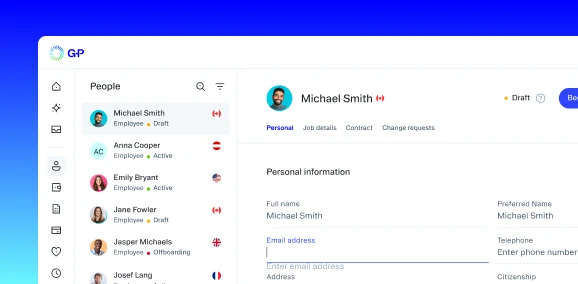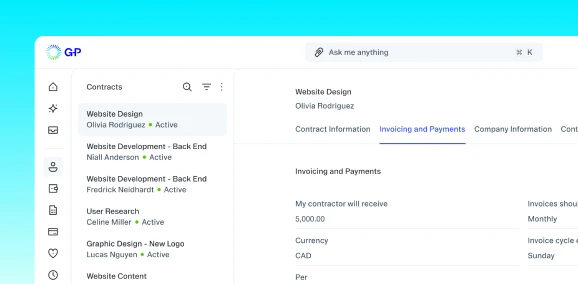Compensation and benefits in Canada: a guide for employers
Navigating employee benefits and compensation in Canada requires a deep understanding of both federal and provincial employment laws to protect workers' rights. Staying compliant is critical, as is offering a competitive benefits package to attract and retain top Canadian talent.
Compensation laws in Canada
Compensation regulations, including minimum wage, overtime, and payroll frequency, are complex due to differing provincial and federal jurisdictions.
Canada minimum wage
Each province and territory sets its own minimum wage, which is subject to regular, often annual, adjustments. For example, Quebec's general minimum wage is CAD 16.25 per hour as of May 1, 2025. Meanwhile, employees in federally regulated sectors (e.g., banking, interprovincial transportation, telecommunications) are subject to the federal minimum wage. As of April 1, 2025, the federal minimum wage is CAD 17.85 per hour.
Working hours and overtime in Canada
A standard workweek is typically 40 hours, but this can vary by province (e.g., up to 44 hours in Ontario). Overtime is generally calculated at 1.5 times an employee's regular rate of pay for hours worked beyond the standard weekly threshold. Certain employees, such as managers and supervisors with significant authority over personnel and business operations, may be exempt from overtime provisions. Employers must adhere to the specific overtime regulations in the province of employment.
Independent contractors in Canada
G-P's AI-powered Classification Engine has you covered with guidance that is legally vetted. It instantly analyzes contracts, flagging risks, and giving you precise recommendations. G-P Contractor’s AI-powered classification engine gives you proactive compliance guidance that's continually updated. So you have peace of mind to grow your team globally, without costly surprises.
Need additional compliance guidance on Canada minimum wage laws and mandatory employee benefits across different jurisdictions? G-P Gia delivers fast, expert vetted HR guidance instantly, and generates legally compliant documents in over 50 countries and all 50 U.S. States.
Statutory employee benefits in Canada
Employers in Canada are required to provide a range of statutory benefits mandated by law. These form the foundation of any compliant benefits package.
• Canada Pension Plan (CPP): A mandatory social insurance program providing retirement, disability, and survivor benefits. For 2025, employers match employee contributions at a rate of 5.95% on earnings up to a set annual maximum. A second, higher earnings threshold is subject to an additional 4% contribution rate.
• Employment Insurance (EI): Provides temporary income support for situations like job loss, illness, or pregnancy. For 2025, employers contribute 1.4 times the employee's premium on insurable earnings up to the annual maximum.
• Workers' compensation: This employer-funded insurance provides benefits to employees who suffer work-related injuries or illnesses. Rates and administration are managed provincially.
• Paid annual leave: Employees in Canada are entitled to paid vacation leave, typically starting at 2 weeks per year and increasing to 3 weeks after 5 or 6 years of service, depending on the province.
• Paid statutory holidays: Canada recognizes several national and provincial statutory holidays, during which employees are entitled to a paid day off. The specific holidays vary by province.
• Parental and maternity leave: Parental leave in Canada allows eligible employees to take job-protected leave for childbirth or adoption, with benefits paid through the EI system. This can extend up to 18 months, combining maternity and parental leave, thus supporting family care.
• Paid sick leave: Federally regulated private-sector employees are entitled to 10 days of paid sick leave per year. Some provinces, like British Columbia (5 days), also have paid sick leave mandates, while others only provide unpaid job-protected leave.
Supplemental & competitive employee benefits in Canada
While Canada's public healthcare system covers essential medical services, it does not cover everything. To be competitive, most employers offer supplemental benefits to fill these gaps and enhance their value proposition.
Canada supplemental health and dental insurance
Group insurance plans are highly valued by employees. These typically cover expenses not included in provincial health plans, such as:
• Prescription drugs
• Dental care
• Vision care (glasses and contact lenses)
• Paramedical services such as physiotherapy and massage therapy
Canada retirement savings plans
Beyond the mandatory CPP contributions, many employers offer supplemental retirement plans, such as a Group Registered Retirement Savings Plan (RRSP) or a Registered Pension Plan (RPP), often with a matching contribution to encourage employee savings.
Other common perks in Canada
To further attract talent, companies often provide additional benefits like performance bonuses, remote work allowances, professional development funds, and enhanced wellness programs.
Canada taxation of benefits
In Canada, most benefits and allowances provided to an employee are considered a taxable benefit if the employee is the primary beneficiary. Cash allowances (e.g., for transportation or wellness) and employer-paid group insurance premiums are generally taxable. Reimbursements for legitimate business expenses, when supported by receipts, are typically non-taxable.
Tax benefits and employee compensation in Canada
Understanding the tax consequences of employee compensation in Canada is essential for employers. While benefits such as cash allowances and employer-paid insurance premiums are taxable, employers can achieve financial efficiency by maximizing non-taxable benefits and pre-tax deductions. Thoughtful planning of benefits packages helps reduce overall tax liabilities and ensures compliance with federal and provincial laws. This approach allows companies to provide valuable coverage while optimizing their compensation strategies
Partner with G-P to build your team in Canada
Navigating Canada's complex, multi-jurisdictional employment landscape can be challenging. A mistake in calculating overtime or administering benefits can lead to significant compliance risks.
With G-P — the #1 rated employer of record— you can offer global employees local, competitive benefits that are continuously updated by our in-house experts to meet country-specific regulations and norms. Easily administer benefits plans through our EOR platform to provide a smooth employee experience.
Contact us to learn how we can help you hire in Canada.




















